||| SUN DAYS ON ORCAS by EDEE KULPER |||
Without further ado, here is the continuation of Clark Cundy’s stories from last week about growing up here on the island and in The Orcas Hotel…
4. Will you share with us some of your colorful memories of growing up in the hotel?
a. I’ll share one that was a standout for me. After the Kaiser Estate workers were done building and left, the hotel morphed again. The back room was remodeled into a dining room complete with South Seas tikis, a small parquet dance floor, and a corner stage. It could seat around 70. The café out front was turned into a bar for cocktails, and the middle room where the workers had meals had a pool table. All the rest of the arcade stuff was gone, with the exception of the jukebox. Nightly in the bar, there was either an open mic or jukebox music. It was never quiet and usually went to 2:30 a.m. (closing time), as dictated by the state liquor laws. If a customer wanted to rent a room, they were warned that the place was rowdy until late. The best remedy was to come down and participate, which they often did. The state must have felt a few hours was necessary to recoup for the next day since any business could start serving drinks at 6 a.m. Music was always the theme, as the rule was set to cater to the islanders early on, so the clientele was blue collar workers from the island – mostly construction workers, well drillers, cement workers, truck drivers, and loggers. There were others too but that was pretty much the core customer. This was a place to go to blow off some steam and have a little fun. It was a group thing, too. When music played, almost everyone got to play some kind of rhythm instrument. There were all sorts of them – maracas, bongos, a tambourine, spoons, wood guiros, bones – anything you could tap, bang, or click was yours to play.
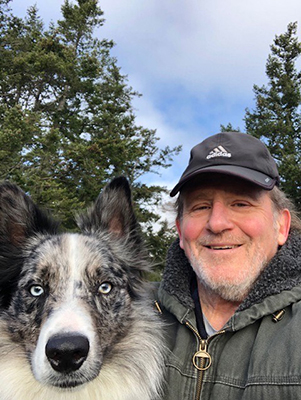 b. Standing by the chimney was a gut bucket. For those of you who don’t know what that is, it’s a musical instrument made from a washtub with a hole drilled in the middle of the bucket and turned upside down. A gut ‘G’ string attached inside the bucket up through the bottom at a length to reach the end of a broomstick, where it was attached. The broomstick on the other end had a notch in it that fit on the rim of the overturned bucket. Then to play, you would hold onto the top of the broomstick, put the bottom notch into the rim and pull on the string with different tensions to get your notes. Many of the patrons waited to play this. Some were better than others at keeping time to the bass notes it produced. Some players exuded a Thelonious Monk style to Johnny Paycheck’s song “Take This Job and Shove It,” which was a jukebox favorite and played multiple times most nights with everyone clanking and banging and singing at the top of their lungs – “Take this job and shove it, I ain’t workin’ here no more.” “Another round for the house bartender!” Jimmy Buffet calls it “Pushing the fool button.”
b. Standing by the chimney was a gut bucket. For those of you who don’t know what that is, it’s a musical instrument made from a washtub with a hole drilled in the middle of the bucket and turned upside down. A gut ‘G’ string attached inside the bucket up through the bottom at a length to reach the end of a broomstick, where it was attached. The broomstick on the other end had a notch in it that fit on the rim of the overturned bucket. Then to play, you would hold onto the top of the broomstick, put the bottom notch into the rim and pull on the string with different tensions to get your notes. Many of the patrons waited to play this. Some were better than others at keeping time to the bass notes it produced. Some players exuded a Thelonious Monk style to Johnny Paycheck’s song “Take This Job and Shove It,” which was a jukebox favorite and played multiple times most nights with everyone clanking and banging and singing at the top of their lungs – “Take this job and shove it, I ain’t workin’ here no more.” “Another round for the house bartender!” Jimmy Buffet calls it “Pushing the fool button.”
c. One of Dick’s ‘philosophies’ in bartending was to keep the patrons in their seats for at least two drinks. He had figured it out with the numbers and regulars that a bar economy could be forecast. So he started each person on what he called the taper. The bar at the hotel was known for its strong drinks and good prices and this appeal kept many coming back with a steady frequency. Each fifth of alcohol was empty after 18 drinks, which compared to a competitor back then in the next bay over who got 28 at the speed bar. “Watered down drinks!” Dad would exclaim.The first drink was pretty strong and was relative to who was doing the drinking. This, of course, was learned over time with a sort of trial and error, and rides were given to the patrons to their houses if they overdid it. The second drink was less strong but was recommended pretty close to the first.They tapered down if there were more drinks.Then some subject was taken up. Usually politics – off-island politics. I watched Dad more than once take up a position on some issue and discuss it with the customer. Then when the customer would start to agree with Dad’s position, Dad would turn it around and argue the opposite, keep them in the seats. He was pretty good at debate but better at pouring. By the time the second drink was getting low, he could tell whether to continue the taper or if the customer would just head out. The idea of course was to make sure those who were driving home were capable of doing so. This didn’t always work out. I personally drove many home in the company VW tour bus. As an islander, being seen in the van and dropped off wasn’t a great way to keep your business your own business. The Orcas grapevine was alive and well, and news would be out about who was driven home. That’s just how it went. Some drove anyway to escape the grapevine.
d. Above is the background for the memory… One night this all went on till 2:30 a.m. but most of the people didn’t want to go home, so Dick decided to take everyone out on the boat to go check the crab pot over in Blind Bay by Shaw. Shirley didn’t want to go so she came and got me up out of bed to go with Dad and make sure everything went okay. I pulled my clothes on and grabbed a coat, even though it was a summer evening. The boat was full when I pulled into the Marina – around 12 people on Dick’s Fifth. When I caught Dad’s surprised eye seeing me rather than Mom, he had me loosen the lines and cast off, and motioned me to the flying bridge to do the skippering to the crab pot. It was an open mic that night and the guitar player was now on board playing “All Day, All Night Maryanne,” which had already been played multiple times earlier in the evening. The rhythm instruments had made it, too, and all were singing, clanking, and banging as we went. I asked Dad how the taper was working tonight. He said nothing and headed below. The first time I saw Pirates of the Caribbean where they pull into Port Royal immediately, I thought of this night. “A pirate’s life for me’…
e. Once we got to the crab pot, Dad had one of the guys use the pike pole and grab the line and start pulling up the pot. The crab would be used in the next day’s Crab Louies in the dining room. Blind Bay isn’t that deep but the pot seemed pretty heavy. When it finally came to the surface, it was really full of crab. We didn’t have anything to put all those crabs in, so we lowered the dinghy and put them in there. When the keepers were counted there were 25. More bait was added to the pot and back down it went. We were idling back to Bay Head full of accomplishment and the music continued. Once back at the dock, the lines were secured and people started getting off. Dad should have had the steps out but didn’t and people were having a little trouble stepping from the boat to the dock, and honestly it was a little awkward. It was lucky nobody fell in as the boat waxed and waned as people had one foot on the boat and one foot on the dock. Everyone bid Dad adieu and headed for the vehicles. By now it was around 4 a.m. and the night had run its course. The crabs, however, needed looking after, so we went back to the hotel for something to put them in. We found our coolers and took two back to the boat. Dungeness crabs, being crabs, weren’t too happy about being handled, and being in the dark with a flashlight made the effort even more risky for being pinched. I held the flashlight and gave Dad much encouragement as he yelped every so often.
f. Back at the hotel with the crabs, we put the big pots on the stove and turned the elements on. We got done with the whole process at about 8 a.m. Mom was just getting up and we had all the cooked crabs in the walk-in cooler, waiting to be picked and cleaned for the Crab Louies. I was really glad it was a Sunday morning, as I headed to my room and went to bed. With all the things that went on at the hotel, I don’t recall anyone being hurt while I was still living there. It was a miracle.
5. In all the years, what are some island changes that have been hard for you to see? What are some welcome changes?
a. The idea of “the local” and my place in it is as important to me now as it was then. What part I played way back when and what part I play in it now are mostly diametrically opposed. The island was a wilder place both naturally and socially back then. Being an actor in both of those arenas and having different roles has taught me a great deal. After living and working as a technical architect in Seattle for a large corporation for 35 years, being married and raising a family, plus life in general has given me many different sensibilities. Today If I went out looking around Orcas I could probably find some of that old island way of being. I don’t see it much now because I’m not looking anymore. I know the island is having some growing pains, but my part in it seems fairly minimal. I love living back here and my wife Joanne loves it, too. We are happily ensconced in our island, its community, and the natural beauty. We try to participate positively where we can.
b. At the front end of this you asked how long have I lived on Orcas. I look at that a bit differently. My maternal grandmother first brought me to Orcas around 1964. She and her friend Helen, who had a boy my age, took us on a two-week vacation every summer to the islands. One week at West Beach and one week over on San Juan Island at Mar Vista Resort. On my last trip with her, I remember standing on the back of the Nisqually ferry almost to Anacortes, and the orange sunset was dipping down below the horizon. I was thinking to myself how I loved those islands and I didn’t want to go back home to the suburbs. The islands were my new home. It was then I became an islander, as the islands had endeared themselves to me. I’ve been an islander ever since and happy to be in that state of mind.


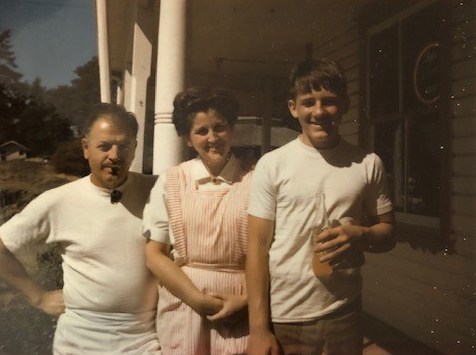

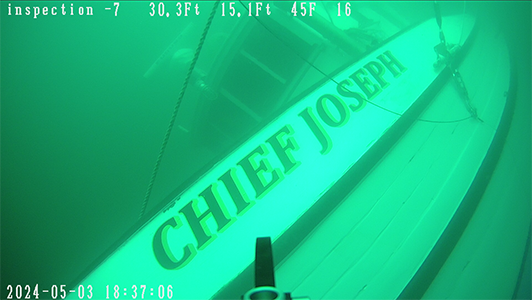
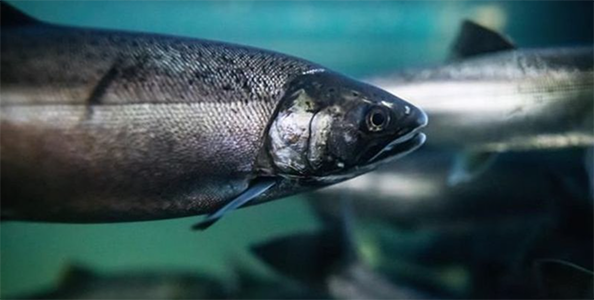
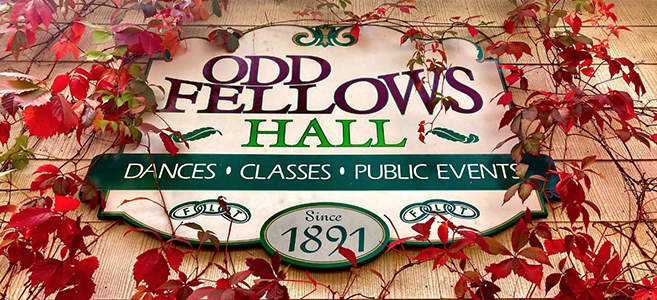



What wonderful memories! Thank you for sharing them.
“The islands were my new home. It was then I became an islander, as the islands had endeared themselves to me.”
I nominate this for the new definition of a native Orcasian. Thanks for the sharing memoires of a past time-the last two paragraphs were especially lovely.
Oh my goodness I remember that gut bucket! We arrived in 71, and Orcas Hotel was the place for good food, music and dancing. In addition to the gutbucket and other rhythm instruments Dick had a small case containing special beer bottles; “matched stubbies.” Maybe Clark will tell us about them in his next installment. As I recall nobody but Dick was allowed to touch them – and could he ever play them!